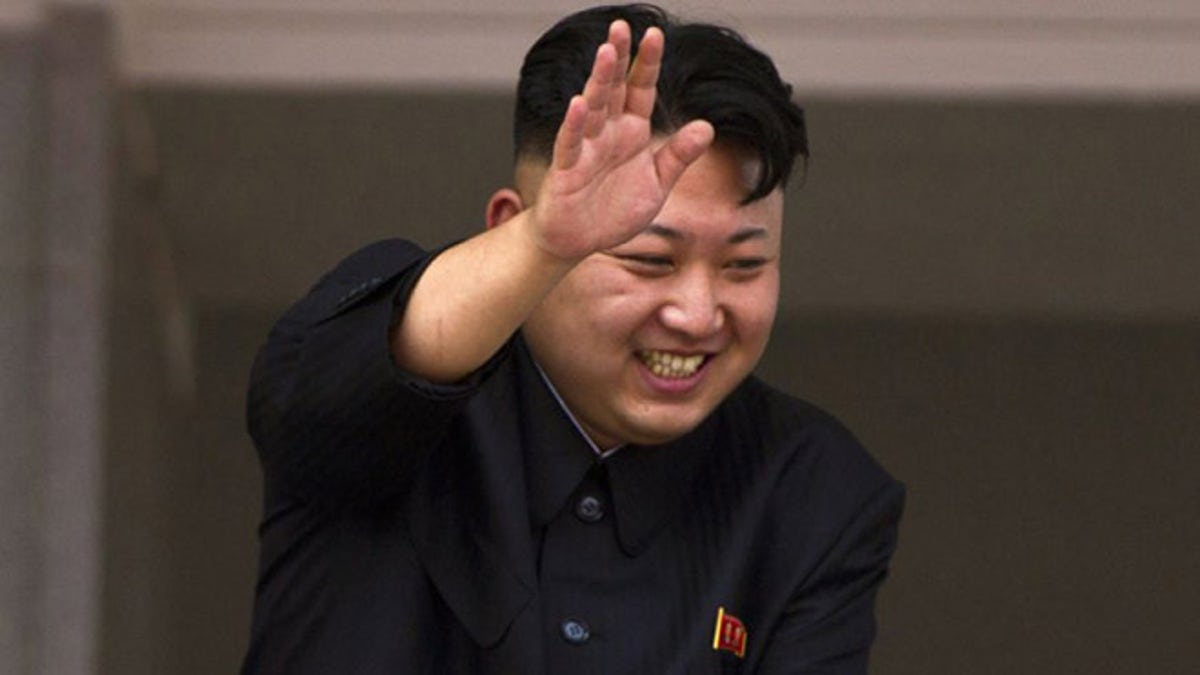
July 27, 2013: In this file photo, North Korean leader Kim Jong Un leans over a balcony and waves to Korean War veterans cheering below at the end of a mass military parade on Kim Il Sung Square in Pyongyang to mark the 60th anniversary of the Korean War armistice. (AP/File)
EXCLUSIVE: A United Nations emergency fund intended to channel assistance to victims of natural disasters and armed conflicts has instead become the U.N. “donor of last resort” in delivering tens of millions of dollars to development programs in despotic North Korea, says an independent study of the funding commissioned by the U.N. itself.
The study warns that U.N. funders are diluting the criteria used to define emergency funding, without being able to make certain the resources are reaching people most in need in the brutally-ruled country, and instead are using the money to maintain a “minimum U.N. agency presence” in North Korea and help “engagement with the government.”
The U.N. has funneled nearly $100 million to the saber-rattling North Korean regime over the past eight years from the world body’s last-ditch emergency relief funding--even though the communist dictatorship “is not a poor country in a major crisis,” according to the study presented to the managers of the U.N.’s Central Emergency Relief Fund, or CERF, last October.
The doses of emergency funding have varied in amount but have come every year except the first one since the money pipeline of the U.N.’s Central Emergency Relief Fund, or CERF, opened in 2006, as part of the U.N.’s Office for the Coordination of Humanitarian Affairs (OCHA).
One reason for the need: normal donors for social or humanitarian U.N. programs have increasingly shunned North Korea as a nuclear-ambitious pariah with an atrocious human rights record, prone to deadly military provocations and hair-raising threats against its neighbors—and under economic and military sanctions orchestrated by the U.N. itself for its illegal nuclear programs.
Perhaps significantly, it was in October 2006 that the dictatorship then run by Kim Jong Il exploded an atomic weapon, leading to economic sanctions by the U.S., Europe and the U.N. itself—and a scandal when it was learned that U.N. agencies were bypassing them. CERF funding for North Korea began shortly thereafter.
Despite additional U.N. and international sanctions levied since, North Korean funding from CERF has continued without a break, rising to as much as $19 million in 2009.
Late last year, CERF announced that it would again grant $3 million to North Korea, on the grounds that its appeals for humanitarian aid were “under-funded.” At the same time, CERF announced support for “under-funded” programs in Syria ($30 million), Lebanon ($18 million), Turkey ($9 million), Jordan ($9 million), Iraq ($8 million) and Egypt ($3.5 million)—all related to the overwhelming Syrian refugee crisis.
CERF funding is handed out only twice a year by the U.N.’s Emergency Relief Coordinator, Valerie Amos, who has recently announced her resignation, effective next month. Countries must be nominated by U.N. agencies to receive the money, and their final selection ostensibly follows a series of complex analyses—as well as, in about one-third of cases, whether their appeals for donated money are “under-funded.”
According to CERF officials contacted by Fox News, “The focus should be the most urgent life-saving humanitarian projects in line with the CERF Life Saving Criteria.”
Among other things, the criteria warn that “CERF funds will not be used to address issues that require long-term interventions, or are not situated in a humanitarian emergency context,” and warn that all aid should be “time-critical” or in the “context of specific emergency response.”
The total North Korean funding from CERF since 2007 has been roughly on par with the totals of emergency money handed out from the fund to such major underfunded global disaster areas as Afghanistan, Haiti, Yemen and Syria, according to CERF statistics. All of those countries, however, have faced much more dramatic crises of upheaval, deprivation and displacement.
There is no doubt that life in North Korea is endlessly miserable for most of its citizens and fatal for many; according to the CERF study, the country “can be characterized as being in chronic development deficit,” with about 10 percent of the population in need of food assistance, and its resistance to any natural disaster is fragile.
But even its most dismal statistics are not the worst of the worst, which is supposedly the focus of greatest CERF concern. According to the CERT study, “global chronic malnutrition (stunting) of children” affects 27.9 percent of North Korean children, but that is “of medium concern” according to the standards of the World Health Organization.
A Fox News examination of four sources cited by CERF itself in how it calculates dire need showed that in two cases, North Korea was assigned a vulnerability rating about the same as, or better than, China’s. In the case of another indicator, a USAID famine early warning system outlook published in September 2014, North Korea is not even mentioned as vulnerable.
But the CERF funds given on the Kim-family despotism formally known as the Democratic People’s Republic of Korea, or DPRK, are not necessarily going to hardest hit in the brutal dictatorship, the study also asserts.
The reason: “Information on the distribution and nature of vulnerability [in North Korea] to underpin planning and fundraising is not consistently available, reliable, or verifiable” in as the study puts it—meaning that the government doesn’t provide adequate information and often prevents foreigners from inspecting the worst-stricken areas .
As the study puts it: “The DPRK government at central and local level has significant capacity to guide, direct, implement and control international assistance to an unprecedented degree.” Most of the U.N. “staffers” who visit aid sites are North Korean government employees, who do not even have contracts with their U.N. agencies.
Some U.N. agencies working in North Korea, notably the World Food Program, claim that they have a “no access, no assistance” agreement with the regime that allows for random access to monitor its aid. But the study notes that “this is still under controlled and monitored conditions.”
The World Food Program’s own internal watchdog, however, has found the claimed oversight to be overstated.
The independent study recommends that CERF rethink the ways the fund does business in North Korea, starting with a “revised humanitarian strategy” that would be built on “fresh assessments’ of the country’s situation that could be communicated “based on a new narrative of vulnerability.”
It also recommends that “application of the CERF life-saving criteria” as applied in North Korea should be “tightened to focus the limited CERF resources on the highly vulnerable.”
George Russell is editor-at-large of Fox News and can be found on Twitter: @GeorgeRussell or on Facebook.com/George.Russell.








































